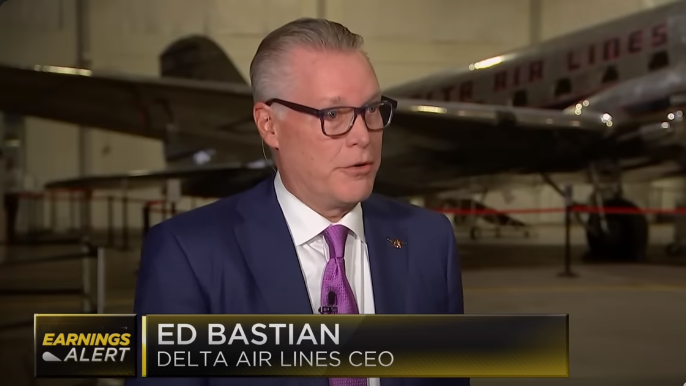As we soar through the ever-shifting landscape of air travel, even the seemingly mundane, like boarding processes, takes center stage in the spotlight of scrutiny and innovation. Ed Bastian, CEO of Delta Air Lines, recently spilled the beans during an interview, shining a light on Delta's stance in response to United Airlines' recent boarding method tweak aimed at speeding up departures.
 |
| Delta Air Lines CEO Ed Bastian on Q3 results, travel demand |
Understanding Delta's Approach
Delta Air Lines, a heavyweight in the aviation arena, has made it clear—they're not looking to mimic United Airlines' fresh boarding tactics. Bastian, in a chat on "Today," hinted at Delta's thorough exploration of various boarding strategies. According to him, the most straightforward approach—just getting people on and moving through the plane—is the speediest. Yet, Bastian isn't ruling out change; if United perfects their method, Delta might just give it a whirl.
United's WILMA Boarding Plan
The buzz revolves around United Airlines' recent roll-out of the WILMA boarding plan, where the acronym is the key to the seating arrangement—window, middle, aisle. Launched just last month, this plan aims to trim up to two minutes off the boarding clock for each flight. United Airlines is banking on this method to make a significant impact, especially in the hustle and bustle of the upcoming holiday travel season.
Delta's Silence and Industry Reactions
Interestingly, Delta opted for radio silence, leaving speculation to swirl around their future boarding game plan. In contrast, United Airlines is vocal about the potential impact of their boarding blueprint, harking back to its pre-2017 roots and predicting a holiday season transformation. This move aligns with broader industry trends, with major carriers gearing up for a holiday travel surge and tweaking their schedules accordingly.
However, not everyone in the industry sees United's shuffle as just an efficiency boost. According to American Airlines pilot Capt. Dennis Tajer, the move might have a financial motive, aiming to cut down on turn times—the time a plane spends at the gate from arrival to departure. This perspective injects an extra layer into the ongoing dialogue about what's driving changes in the airline industry's boarding playbook.
The Airline Industry Landscape
As we delve deeper into the intricacies of airline boarding processes, it's crucial to widen our view to encompass the broader landscape of the airline industry. With major carriers anticipating a surge in demand during the holiday season, they're already fine-tuning schedules to meet traveler expectations.
Financial Implications and Operational Efficiencies
Let's talk dollars and cents. For United Airlines, the projected savings of up to two minutes per boarding, multiplied across numerous flights, can translate into substantial operational efficiencies. However, a healthy dose of skepticism lingers, with some industry insiders questioning whether the efficiency drive is primarily fueled by financial considerations.
Looking Ahead: The Future of Air Travel Boarding
As airlines navigate the complexities of the post-pandemic travel landscape, the spotlight on operational efficiency becomes even more pronounced. The debate swirling around boarding processes captures the delicate dance between streamlining operations and providing passengers with a seamless experience. While Delta currently tilts towards the simplicity of 'just boarding people,' the fluid nature of the industry leaves room for potential shifts in strategy.
In conclusion, the ongoing conversation between airlines like Delta and United regarding boarding processes underscores the industry's perpetual quest for optimization. Whether it's propelled by operational efficiency, financial considerations, or a mix of both, these changes are molding the future of air travel. As the holiday season approaches, the effectiveness of these strategies will undoubtedly face scrutiny, offering valuable insights into the ever-evolving dynamics of the airline industry.
F.A.Q.
Question 1.
Q.: What is the recent boarding process change discussed in the article?
A.: The recent boarding process change involves United Airlines implementing a new method, known as WILMA, standing for window-middle-aisle. This approach aims to streamline the boarding process and reduce departure time.
Question 2.
Q.: What is Delta Air Lines CEO Ed Bastian's stance on United's new boarding process?
A.: Ed Bastian has indicated that Delta Air Lines currently has no plans to emulate United's new boarding method. However, he acknowledged openness to adaptation, stating that if United refines their method successfully, Delta would consider implementing it.
Question 3.
Q.: Why is Delta hesitant to adopt United's boarding method?
A.: Delta's hesitation to adopt United's boarding method stems from their belief that the most straightforward approach, "just boarding people" and facilitating movement through the plane, is the fastest. According to Bastian, adding more features complicates the process.
Question 4.
Q.: What is the potential impact of United's boarding plan on the boarding time for each flight?
A.: United Airlines has stated that the new seating plan, implemented last month, is expected to save up to two minutes on the boarding process for each flight. This change applies to all domestic and some international flights, enabling the carrier to increase its overall flight capacity.
Question 5.
Q.: How does the industry perceive United's boarding policy change?
A.: The industry response to United's boarding policy change is mixed. While United anticipates operational efficiencies and has projected a cumulative impact during the busy holiday travel season, there are differing opinions. American Airlines pilot Capt. Dennis Tajer suggests that the move might be financially motivated, aiming to decrease turn times and enhance profitability.
Comments
Post a Comment